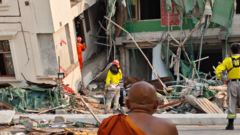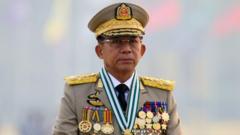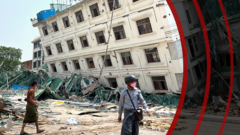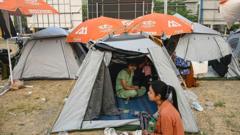Military assaults persist, leaving humanitarian aid efforts and quake survivors in dire conditions.
Myanmar's Ceasefire Crumbles Amid Ongoing Violence Following Earthquake
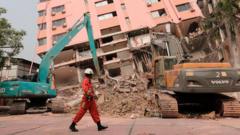
Myanmar's Ceasefire Crumbles Amid Ongoing Violence Following Earthquake
Despite attempts at temporary ceasefires, Myanmar faces continued military clashes as relief efforts struggle.
Fighting continues in Myanmar even after the military junta and a coalition of rebel groups declared ceasefires aimed at facilitating earthquake relief. Reports from the UN Human Rights office indicate that the military has conducted at least 14 attacks since the ceasefires were announced. The military blames two guerrilla factions within the alliance for these skirmishes, while one of the rebel groups claims the clashes were a response to military offensives.
Maj Gen Zaw Min Tun, the spokesperson for the military council, stated that any attacks on military positions would be met with a response. Despite requests for comment from BBC Burmese, a military spokesperson did not provide a response.
UN High Commissioner for Human Rights Volker Türk has called for an immediate cessation of military operations, emphasizing the need to focus on aiding those affected by the recent earthquake and ensuring that humanitarian organizations have unrestricted access to provide assistance. The earthquake, which struck with a magnitude of 7.7 on March 28, has officially led to a reported death toll of 3,564, with 5,012 individuals injured and 210 persons still unaccounted for as stated by state media.
Rescue operations in Mandalay reported recovery of casualties from collapsed buildings over the weekend. However, recent rainfall may impede ongoing relief efforts. The UN Human Rights office noted that while humanitarian work has advanced in some accessible regions, enduring restrictions imposed by the military have hindered assistance in several critically affected areas, relying mostly on localized efforts by the residents.
UN humanitarian chief Tom Fletcher expressed the urgent needs of the population, asserting that they require food, potable water, restoration of power, and adequate shelter. He mentioned that aftershocks, including a 4.9 magnitude quake recorded over the weekend, have compounded the trauma for those affected. He added that, prior to the earthquake, nearly 20 million people in this region were already facing severe needs, exacerbating the situation into a multifaceted crisis marked by the earthquake, ongoing conflict, and pre-existing humanitarian challenges.






